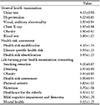Abstract
Background
Current National Health Examination (NHE) in Korea provides health examination to the public throughout the entire life course; however, management after NHE is not sufficiently delivered. In this study, we investigated knowledge and attitude of health care providers in order to revise result forms and counseling manual of NHE.
Methods
We recruited 30 doctors, who undergo NHE, and conducted survey from January 7, 2016 to January 26, 2016. Participants answered questionnaires regarding difficulty of explaining each items of result forms, difficulty of counseling each items of NHE, and ways of improvement. Furthermore, we conducted in-depth interview regarding pros and cons of NHE and improvements needed.
Results
The average Likert score for difficulty of explaining items of result forms was lowest (3.8/5.0 points) for blood test due to its graphic format. Difficult counseling items were mental health, mild cognitive impairment and dementia, and healthcare for the elderly. The proportions of doctors, who often counsel these items, were less than 40%. In the in-depth interview, health care providers suggested that examinees' knowledge for result forms decreases because it is hard to interpret, and management after NHE should be improved by undertaking NHE in primary health care facilities.
Conclusions
The graphic format of blood test result form should be revised into readable format, and contents of counseling manual for mental health, mild cognitive impairment and dementia, and healthcare for the elderly should be improved. Financial support for doctors should be provided, and NHE should ultimately be reinforced in primary health care facilities.
Figures and Tables
Table 2
Mean Likert scores for difficulty to explain the results of GHE and difficulty of counseling LTPHE

References
1. National Law Information Center. Framework Act on Health Examinations, Article 3 [Interenet]. Sejong: Ministry of Government Legislation;2015. Accessed Oct 22, 2017. Available from:http://www.law.go.kr/eng/engLsSc.do?menuId=1&query=health+examination&x=0&y=0#liBgcolor0.
2. Cho B, Lee CM. Current situation of national health screening systems in Korea. J Korean Med Assoc. 2011; 54(7):666–669.

3. Kim YS. Revision of adult health examination form and counseling manual of national health screening program. Cheongju: Korea Centers for Disease Control and Prevention;2016.
4. Korea Centers for Disease Control and Prevention. Results of 2013 Korea National Health and Nutrition Examination Survey. Cheongju: Korea Centers for Disease Control and Prevention;2013.
5. Kim YS. Developing a Manual for National Screening and Counseling of People in a Transitional Period. Health Welf Policy Forum. 2008; 42–57.
6. Oh IJ, Choi HY, Kang SY, Lee HA, Kim YS. Examinees' knowledge of the result form of Korean National Health Examination. Korean J Health Promot. 2017; 17(3):168–175.

7. Fiore MC, Jaén CR, Baker TB, Bailey WC, Benowitz NL, Curry SEEA, et al. Treating tobacco use and dependence: 2008 update-clinical practice guidelines. Rockville: U.S. Department of Health and Human Services, Public Health Service, Agency for Healthcare Research and Quality;2008.
8. Lancaster T, Stead L, Silagy C, Sowden A. Effectiveness of interventions to help people stop smoking: findings from the Cochrane Library. BMJ. 2000; 321(7257):355–358.

9. Jonas DE, Garbutt JC, Amick HR, Brown JM, Brownley KA, Council CL, et al. Preventive Services Task Force. Behavioral counseling after screening for alcohol misuse in primary care: a systematic review and meta-analysis for the U.S. Ann Intern Med. 2012; 157(9):645–654.
10. Joo J. Korean culture of heavy drinking and directions on policy related to alcoholism. J Public Welf Adm. 2009; 19(1):73–115.
11. Kim SG, Kim JS, Pack HJ, Sung HN. Diagnostic usefulness of Korean standard on heavy drinking for the DSM-5 alcohol use disorder. Korean J Health Promot. 2017; 17(2):91–98.

12. van Rijswijk E, van Hout H, van de Lisdonk E, Zitman F, van Weel C. Barriers in recognising, diagnosing and managing depressive and anxiety disorders as experienced by Family Physicians; a focus group study. BMC Fam Pract. 2009; 10:52.





 PDF
PDF ePub
ePub Citation
Citation Print
Print




 XML Download
XML Download